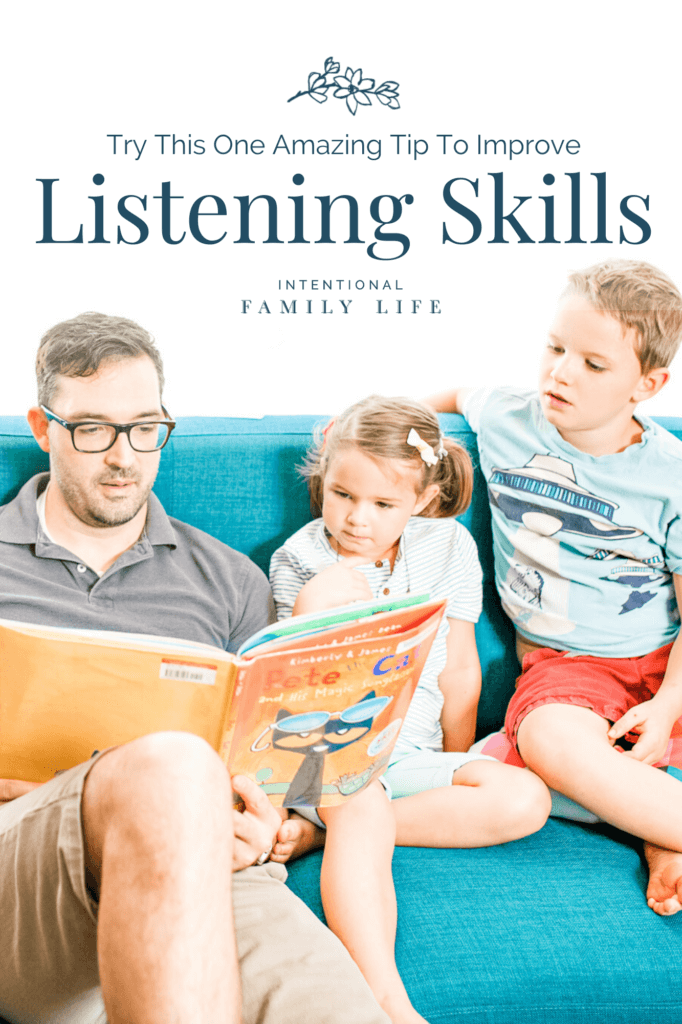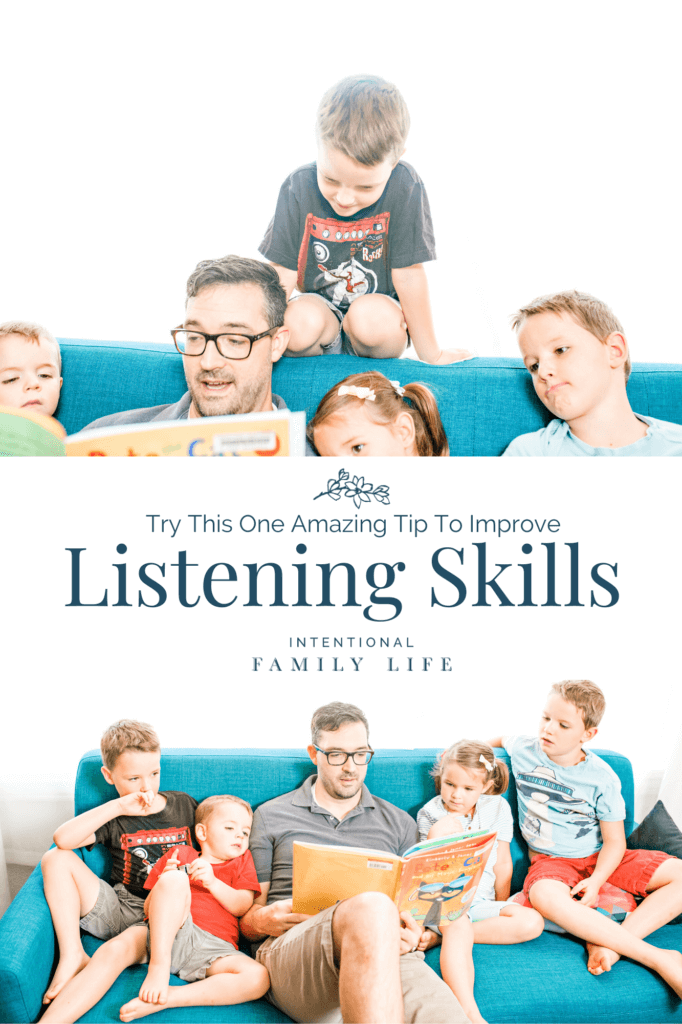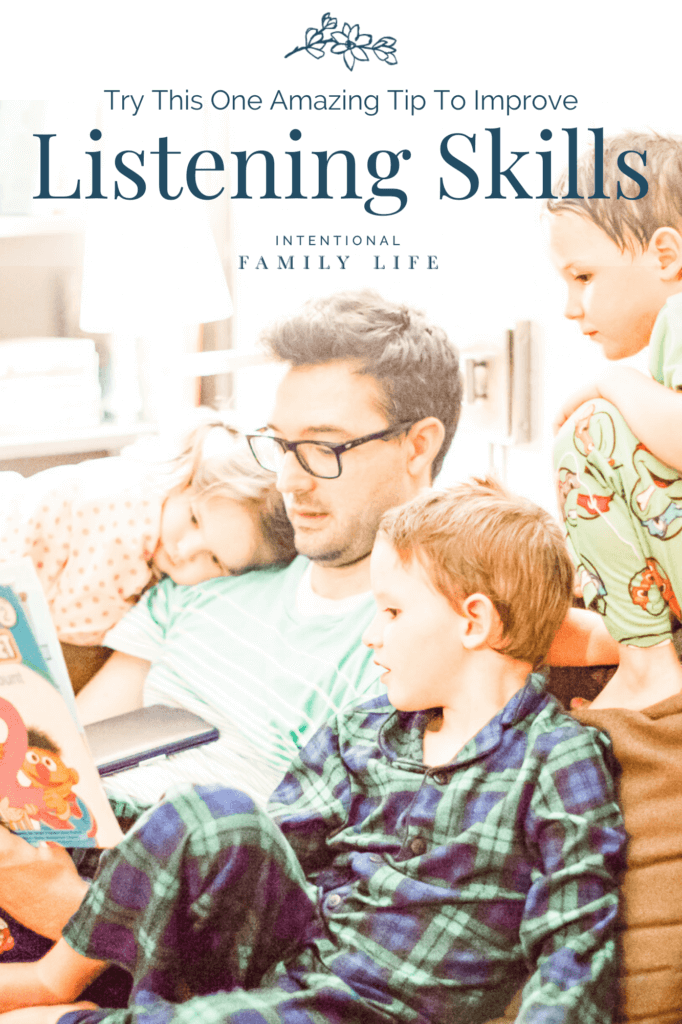Spoiler alert: Reading aloud to children is one of the most effective activities to help kids improve listening skills. Listening skills are among the four pillars of language skills, in addition to reading, writing, and speaking. Today, teaching active listening skills is important all the way through middle school to ensure that kids are always sharpening this important skills.
I Just Don’t Feel Like My Child Listens – But We’ve Tested His Hearing
Super perceptive, mama!
Hearing and listening are very different skills. A physical function – hearing – is one of our five senses. Hearing happens involuntarily.
Listening requires concentration so that your brain processes meaning from the words. Any skill – such as listening – can be developed and improved.
Listening leads to learning.
Listening also includes reading verbal and non-verbal cues such as body language and facial expressions and then assimilating that information with the meaning from the words themselves.
In order to improve your skills, you will want to be fully concentrating; listening actively means that you are understanding the meaning of the language that you are hearing.
Reading Aloud Builds Listening Skills
Reading builds listening skills. It’s that simple.
Researchers have found that the four language skills: listening, speaking, reading and writing are all integrated and contribute to one’s understanding of the world around them. Reading and listening are receptive skills; writing and speaking are productive skills. And according to research, there are substantial correlations between these four language processes. So when students are listening they are also advancing their other language skills. – listenwise.com
Even if you think there is nothing you can do to help your child build listening skills, because kids “just know how to listen,” there is.
In fact, reading, listening, writing, and speaking are all related language skills.
Reading is the very foundation of learning. This is why it’s important for kids to develop strong listening skills.
Luckily for parents, reading aloud to our kids helps them build those listening skills naturally.
You may be wondering how to approach learning so that you can read aloud to your child and build active listening skills. Keep reading to find out.
Kids Listen at a Higher Level Than They Read
Kids have a higher comprehension level when they are listening. Think about how much your kids understand when you speak to them. It’s likely that they aren’t yet reading at that high of a level. This is true even for reading aloud to big kids!
Related Post You May Also Like: 12 Enchanting Read Aloud Books We’ve Chosen For Summer
This is why kids take interest and enjoy listening to books that are written several levels above their current level of reading ability..
And here’s the really cool thing. Even if your kiddo struggles with reading, has dyslexia, or just isn’t a great reader, they can still improve their active listening skills. Remember, the four language skills: listening, speaking, reading and writing are all integrated so when students are improving their listening they are also advancing the other language skills!!
Listening Skills Help Reading Comprehension
Ask 500 teachers and it’s likely that all 500 will tell you the most important part of learning is reading. So, comprehension is critical. Somewhere around third or fourth grade, children stop learning to read and begin reading to learn.
Stronger listening skills help develop good reading comprehension.
Exposing children to high quality listening resources is going to help them build up those infinitely important reading comprehension abilities. And make no mistake; it’s never too early to start. I’ve even give you so of the most amazing books for the tiniest story lover!
That’s one of the reasons that I write on this site sharing the high quality resources that I find so you can share them with your family.
If you are what you eat, then your language skills are what you read.
Language Skills Increase As The Ability To Listen Increases
If a child can listen to a story, they can build up what is going on in the story, inside their head. This is called a mental representation.
When the child hears text, he builds up a mental representation in his mind. This is another way reading builds listening skills. With certain reading tasks, kids are learning to build up their listening skills as well. Think about vocabulary and summarizing, both are skills that a student will learn through both reading and listening.
Reading Aloud Helps Children Learn How to Focus
When a child is sitting listening to a story, they are learning one of the most imperative soft skills – that of learning how to pay attention. There aren’t a lot of activities that can hold a child’s attention for that long, which is why reading helps kids learn to focus, which in return can help with their language skills, including listening.
Reading requires kids to sit and listen for what is happening next. If you’re not listening, you may just miss what’s happening next.
Hearing Stories Aloud Increases Vocabulary
Reading and listening go hand in hand because it enhances vocabulary. Kids need to hear language in order to learn new words. Reading introduces new vocabulary, which in return helps kids develop their skill of listening, so they don’t miss out on those new words.
Reading and listening are also imperative to learn “understandable, reliably correct, and appropriately sophisticated language patterns.”
One simple and immutable fact about the human brain is that you can’t get something out of it that isn’t there to start with.
Supernatural inspiration notwithstanding, human beings in general—and children in particular—really can’t produce thoughts or concepts that they haven’t first experienced and stored. In other words, we cannot think a thought we don’t have to begin with. Even the most unique, creative, and extraordinary ideas can only exist as a combination and permutation of previously learned bits of information. What does this mean for the writing teacher who desires to nurture competence? If what we need is a student who is able to produce “understandable, reliably correct, and appropriately sophisticated language patterns,” then what we must put into the brain are those same reliably correct and sophisticated language patterns. – (the emphasis added is my own) Andrew Pudewa
Reading Builds Listening Skills So Kids Can Learn More
There is a reason that people say that reading and writing are the foundations of learning. Once a student learns how to read, it helps them with all of the four language skills, which can be transferred over to help comprehend what’s being taught in science and math. It’s one big cycle of learning, but reading helps plant the seeds for a lifetime of learning.
When you read to a child they are gaining valuable skills, including active listening, the ability to stay focused and maintain eye contact, and learning to interpret thoughts and feelings and facial expressions.
Reading helps children learn to listen, learn to focus, learn new vocabulary, and generally helps kids think at a higher level.
Don’t Forget To Pin This So You Can Come Back Later!






